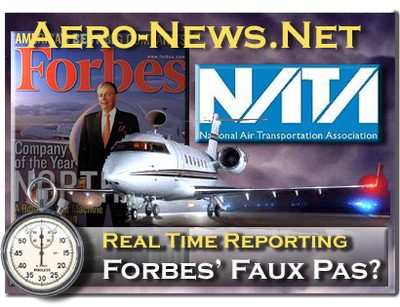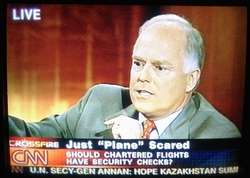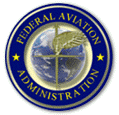NATA's Coyne: Article "More Befitting The Entertainment
Tabloids"
National Air Transportation Association President James
Coyne issued the following statement Wednesday in response to
the cover story in Forbes Magazine titled "Flight
of Fear."

"In his article Flight of Fear (April 9, 2005, Forbes Magazine)
Seth Lubove’s misuse of facts is more befitting the
entertainment tabloids, then a credible publication like
Forbes.
"The article is filled with bad statistics, bad information, a
complete lack of understanding of a complex industry, dubious
quotes, and the reporter's blatant bias toward an industry that has
a very strong safety record that is improving every day.
"To illustrate, Lubove cites as an example of the safety "problems"
of the charter industry an accident involving Air Sunshine in July
of 2003. What Mr. Lubove overlooked was the fact that the Air
Sunshine plane was a scheduled commuter flight whose crash was
listed in the airline safety statistics against which he compares
the on-demand charter safety record.
 "Throughout the article, Lubove
paints an entire reputable industry with the same very wide
brush. However, statistically speaking, not every Part 135
operator is providing on-demand passenger charter services. Part
135 operators include air construction operators, air ambulance and
rescue flight operators, and even small Alaskan ski and float plane
operators landing in the remote wilderness. To statistically
lump these more hazardous duty operations with the "cross country
round-trip Gulfstream II" kind of on-demand air charter again shows
his lack of understanding about this industry.
"Throughout the article, Lubove
paints an entire reputable industry with the same very wide
brush. However, statistically speaking, not every Part 135
operator is providing on-demand passenger charter services. Part
135 operators include air construction operators, air ambulance and
rescue flight operators, and even small Alaskan ski and float plane
operators landing in the remote wilderness. To statistically
lump these more hazardous duty operations with the "cross country
round-trip Gulfstream II" kind of on-demand air charter again shows
his lack of understanding about this industry.
"As an example, on-demand passenger jet charter experienced only
five fatal accidents in the past four years according to the
National Transportation Safety Board which does not equal "18 times
as likely" to end up in an accident compared to commercial jet
aviation as stated in the article. Furthermore, the industry is
composed of well over 11,000 individual aircraft – more than
are operated by all of the scheduled airlines combined.
"The National Air Transportation Association believes that any
accident is a great tragedy, and as a representative of the
industry we work to make improvements in safety. This includes
participation in efforts to revise current regulations as
participants in the Part 135 Aviation Rulemaking Committee (ARC),
introduction of new safety enhancing technology, and advanced
simulator training for pilots (on par with the airline
industry.)
"In order for an on-demand operator to qualify for a Part 135
certificate, the operator must demonstrate to the Federal Aviation
Administration (FAA) how they will comply with every one of
hundreds of rigorous regulations. Additionally, the overhaul
of charter rules to which Lubove refers is actually a two-year
process involving many different segments of the
industry.
The ARC, of which NATA is a member, is tasked with further
improving the stellar safety record of on-demand
operators. Additionally, industry sponsored safety programs
like the NATA Safety 1st Program and the Safety Management System
(SMS), which seek to identify best practices to further reduce en
route and on ground accidents, are receiving unprecedented
participation from operators.
"To further demonstrate the author's lack of credible reporting,
NATA provided Lubove with quotes, statistics, and even arranged for
him to visit with a reputable on-demand operator. Despite
this, he failed to even once mention any of that side of the
industry in his article. Additionally, Lubove took the
comments of several FAA employees meeting in an informal setting to
discuss the perception of a problem out of context and attributed
them all to one official.
 "To read Lubove's story, one would
mistakenly assume aircraft charter is patently unsafe, which could
not be farther from the truth. A more accurate piece of reporting
would have included guidance to the reader that would help them
select a reputable and safe operator, such as NATA's publication
Chartering An Aircraft, A Consumer Guide To Help You Fly
Smarter.
"To read Lubove's story, one would
mistakenly assume aircraft charter is patently unsafe, which could
not be farther from the truth. A more accurate piece of reporting
would have included guidance to the reader that would help them
select a reputable and safe operator, such as NATA's publication
Chartering An Aircraft, A Consumer Guide To Help You Fly
Smarter.
"On-demand operators are safe, are much less expensive then
described in Lubove's article, and deserve to be portrayed in a
fair and accurate light. NATA is very disappointed in Forbes for
failing its readers so badly on this issue and for falsely
characterizing an entire segment of our national air transportation
system based upon faulty data, inaccurate assumptions, and the
anecdotal actions of a few allegedly bad apples.
"At a time when the media is constantly under fire for failing to
accurately report the facts, it appears that the only fiery crash
present in this article is Lubove's credibility going down in smoke
for trying to make a name for himself with sensationalism instead
of truth.
 ANN's Daily Aero-Linx (05.06.25)
ANN's Daily Aero-Linx (05.06.25) ANN's Daily Aero-Term (05.06.25): Ultrahigh Frequency (UHF)
ANN's Daily Aero-Term (05.06.25): Ultrahigh Frequency (UHF) ANN FAQ: Q&A 101
ANN FAQ: Q&A 101 Classic Aero-TV: Virtual Reality Painting--PPG Leverages Technology for Training
Classic Aero-TV: Virtual Reality Painting--PPG Leverages Technology for Training Airborne 05.02.25: Joby Crewed Milestone, Diamond Club, Canadian Pilot Insurance
Airborne 05.02.25: Joby Crewed Milestone, Diamond Club, Canadian Pilot Insurance





